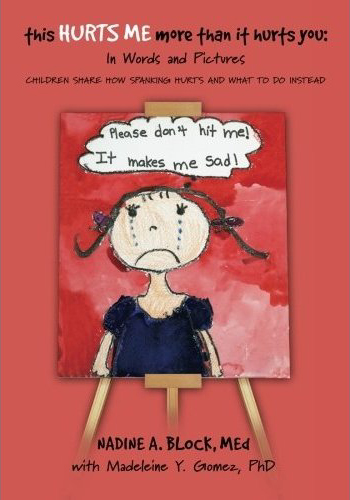GUEST BLOG: This Hurts Me More Than It Hurts You
Hurts Me More Than It Hurts You has been awarded second place for Interior Design and Honorable Mention for Parenting in the Royal DragonFly Book Contest.
Great work, Nadine Block and Madeleine Y. Gomez!
And many, many thanks to the children who contributed their artwork and unique words to make this book a reality. It can be ordered at Amazon.com, linked near the bottom of this page. All proceeds benefit the Center for Effective Discipline.

This Hurts Me More Than It Hurts You: In Words and Pictures, Children Share How Spanking Hurts and What To Do Insteadis not another parenting tome by an ivory-towered theorist. This eye-opening book is written and illustrated by those most affected by spanking — children. Their words and drawings show that spanking doesn’t result in the behaviors parents and teachers desire. Instead, it sows seeds of pain, despair, humiliation, confusion, anger — and the continuation of a cycle of violence. Ohio girl age 12 “Would you like to be spanked? No, of course not. It hurts and nobody likes to be hurt. Do you really want a child to be scared when they make a mistake or would you rather have them learn something from it. Once the spanking is over it’s easy to forget what they even got in trouble for. The punishment is just too quick. The child doesn’t even have time to think about the mistake they made” NH boy age 14 “When a child is getting hit, he feels like he is hated and no one loves him. Over time, children start putting up bricks around their heart. When they get older, they may become a cold and callous person who can’t love. “The children also share what disciplinary tactics are effective. Parents, educators and child-care professionals may be shocked to find that reasoned discussions, loss of privileges, “timeouts,” and the opportunity to atone for misbehaviors work better than spanking. Ohio girl age 14 “When I make mistakes my parents will say, ‘Well what are you going to do about it?’ Sometimes they will force me to think for myself. That tells me they think I can do it. Whenever I think my parents think so highly of me, it makes me feel real good!” Illinois boy age 13 “Adults can teach children without spanking by using punishments or just talking to them. The way my parents punish me is by taking my video games and my cell phone to. Now, that’s a punishment because I love my phone. Right now I don’t have my phone because of a punishment.” The editors include a section for parents and professionals on questions and answers about spanking and helpful books, video, and internet resources. The book is edited by Nadine Block MEd, a school psychologist, and Madeleine Y. Gomez, PhD, a clinical psychologist, who have spent decades studying the effects of physical punishment on children. The editors will donate book sale proceeds to non-profit organizations working to end corporal punishment of children and promote non-violent child discipline.
About the Co-editors
NADINE BLOCK has worked as a teacher, school psychologist and consultant to mental health organizations. She founded the Center for Effective Discipline in l987 and served as its executive director until 2010. The organization is dedicated to ending corporal punishment of children through education and legal reform. She has developed policies and directed legislative action to ban corporal punishment of children in schools at state and national levels. In l998, she initiated SpankOut Day April 30th to provide information about the effects of physical punishment of children and alternatives to its use. More than l2,000 parents have attended SpankOut Day programs. The observance has been adopted by organizations in several countries. She coordinated a coalition of 50 Ohio organizations which finally achieved a legislative ban on school corporal punishment in Ohio public schools in 2009. Her commitment to ending all corporal punishment of children stems from a firm belief that children are entitled to the same freedom that all other citizens enjoy, to be free from physical assault. Nadine has received many awards and has been interviewed on Larry King Live, Hannity and Comb, ABC News, New York Times, USA Today, Good Morning America, BBC Channel 4, London, CBS 48 Hours, Redbook, Reuters Health Network, NBC Today, and by many other media sources.
MADELEINE Y. GOMEZ, PhD, is a licensed clinical psychologist and president of PsycHealth Ltd., a certified minority and women’s behavioral health-care organization established in 1989. PsycHealth Ltd. has received URAC Gold and Bronze Awards as well as a Global Communications League of American Communications Professionals Bronze Award. Dr. Gomez is widely respected in her area of specialty—children, families, and abuse. A published researcher, presenter, and assistant professor at Northwestern University, she is also a lifelong human rights advocate. The Southern Poverty Law Center recognized her “outstanding dedication to human rights and equal justice,” and the Chicago Board of Education honored her with its Voices of Freedom Award for her work promoting nonviolence and “continuously supporting the self-esteem” of students in Chicago Public Schools. In 2010, Dr. Gomez received the National Psychologist Award from the Dorland Group for her work dedicated to nonviolence, serving the underserved, and promoting quality care.
Nadine and Madeleine are parents and grandparents.

